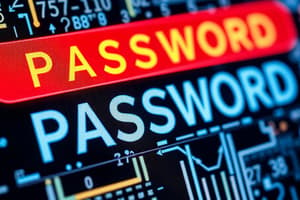Podcast
Questions and Answers
What is a recommended length for a strong password?
What is a recommended length for a strong password?
- At least 8 characters
- At least 12 characters (correct)
- At least 10 characters
- At least 15 characters
Which of the following should be avoided when creating a strong password?
Which of the following should be avoided when creating a strong password?
- Using common words (correct)
- Using uppercase letters
- Using a passphrase
- Using special symbols
What is one best practice for managing passwords across multiple accounts?
What is one best practice for managing passwords across multiple accounts?
- Change passwords only when forgotten
- Create a unique password for each account (correct)
- Use the same password for all accounts
- Write down passwords on paper
How often should you consider updating your passwords?
How often should you consider updating your passwords?
What is the function of a password manager?
What is the function of a password manager?
Why are strong passwords crucial for cybersecurity?
Why are strong passwords crucial for cybersecurity?
What is a characteristic of a strong password?
What is a characteristic of a strong password?
How can using unique passwords for different sites benefit you?
How can using unique passwords for different sites benefit you?
What kind of attacks can strong passwords help mitigate?
What kind of attacks can strong passwords help mitigate?
What should you regularly do to maintain password security?
What should you regularly do to maintain password security?
What does a strong password primarily help to achieve?
What does a strong password primarily help to achieve?
Which of the following components should be mixed in a strong password?
Which of the following components should be mixed in a strong password?
Why is it important to regularly update a password?
Why is it important to regularly update a password?
What is a recommended approach to password creation?
What is a recommended approach to password creation?
How can using different passwords for different accounts be compared to physical security?
How can using different passwords for different accounts be compared to physical security?
What is the effect of making a password more complex?
What is the effect of making a password more complex?
Which phrase best describes the relationship between password strength and cybersecurity?
Which phrase best describes the relationship between password strength and cybersecurity?
What type of phrase should be used as a base for creating passwords?
What type of phrase should be used as a base for creating passwords?
To exemplify increased security, which transformation of a base phrase is given?
To exemplify increased security, which transformation of a base phrase is given?
What is the main analogy used to explain strong password practices?
What is the main analogy used to explain strong password practices?
Study Notes
Strong Passwords - Cybersecurity
- Strong passwords are the first layer of defense against cyber threats
- Weak passwords increase risk of unauthorized access to personal information, financial data, and identity
- Examples of cyber threats mitigated by strong passwords: hacking, phishing and social engineering
Strong Password Best Practices
- Character Variety: Combine uppercase & lowercase letters, numbers, and symbols (@ # $ %) to create complex passwords
- Avoid Common Words & Personal Info: Do not use easily guessable information like name, birthdate, or simple sequences (123456, password)
- Password Length: Aim for at least 12 characters, longer passwords are more difficult to crack
- Unique Passwords: Use distinct passwords for each online account
- Passphrases: Use random words or sentences for memorability, e.g., "BlueSky@Night!2021"
- Regular Updates: Change passwords every 3-6 months
- Password Managers: Utilize programs to store and generate complex passwords
Strong Password Applications
- Online Banking Accounts: Secure financial information
- Email Accounts: Prevent unauthorized access to email and other personal information
Password Analogy
- Strong password = sturdy lock with multiple securing mechanisms to protect valuable digital assets
- Unique passwords for each account = separate keys for different rooms in a home
Strong Password Creation Guide
- Step 1: Brainstorm a Base Phrase: Use meaningful but not easily guessable line from a song, quote, or combination of random words
- Step 2: Add Complexity with Symbols and Numbers: Enhance base phrase with numbers & special characters
- Step 3: Mix Uppercase and Lowercase Letters: Include both for added security
- Step 4: Ensure Sufficient Length: Aim for at least 12 characters
- Step 5: Use Unique Passwords: Each account should have a distinct password
- Step 6: Regularly Update Passwords: Ideally every 3-6 months
- Step 7: Test Password Strength: Use online tools to assess security
- Step 8: Utilize a Password Manager: Generate and store strong passwords
Studying That Suits You
Use AI to generate personalized quizzes and flashcards to suit your learning preferences.
Related Documents
Description
This quiz covers the essential practices for creating strong passwords to enhance your cybersecurity. Learn how to protect your personal information from threats like hacking and phishing by applying best practices such as character variety and using unique passwords. Test your knowledge and ensure your online security.




